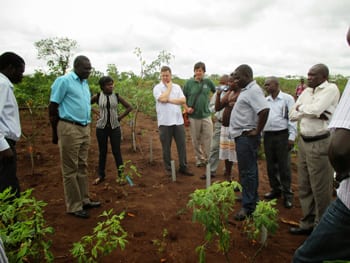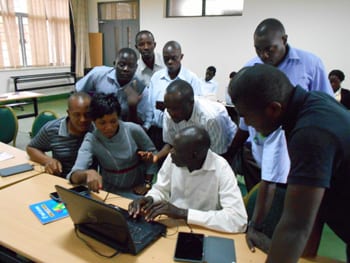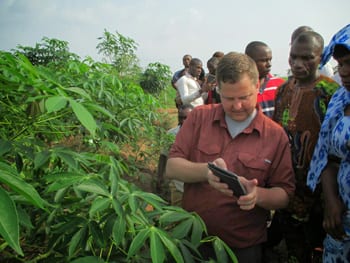News
BTI Cassavabase Project in Africa

Dr. Jeremy Edwards and Dr. Lukas Mueller traveled to Nigeria and Uganda, to help researchers in the field improve databases which store information about cassava field trials.
Cassava is an usual tropical plant—while toxic in its raw state, once the root is processed into a flour, it becomes a source of carbohydrates that is heavily relied on as a staple in developing countries, particularly in Africa. “It’s a really fascinating plant,” says BTI scientist Lukas Mueller. He and his colleagues, through a grant from the Bill and Melinda Gates foundation, are aiming to improve the cultivation of cassava by helping to build a database (“Cassavabase”, http://cassavabase.org/) that compiles correlated genotypic and phenotypic information. “Thanks to new technology, genotyping has become extremely affordable, so you can create models between genotype and phenotype that tell you what a plant will look like by only knowing its genotype.”
This method would vastly improve on the traditional technique of breeding, in which farmers make breeding decisions based on observing traits – phenotyping – each generation of plants. If there is a database of genetic markers for desired traits in a plant, plant scientists and breeders can determine whether it is worth cultivating. However, to create a functional database takes effort. “You need to track your data really well,” says Mueller. “You have to correlate the huge amount of genetic information with the highly complex phenotypic information.” Once this database is large enough, breeding centers can retrieve exact information on what lines to breed for the best results.
Additionally, the Cassavabase database is open-access, unlike many other plant genome databases developed by for-profit seed companies. “In the commercial sector, they’re more secretive about genetic information, since that’s the competitive advantage that they are selling,” says Mueller. Breeders and farmers around the world can benefit from the Cassavabase information at no cost. “Hopefully, if we can show that genomic selection actually works, it will speed up breeding breakthroughs by a huge margin, even by two to three times faster.” That means better disease and drought resistance and higher yields of this poisonous-turned-palatable staple crop.



